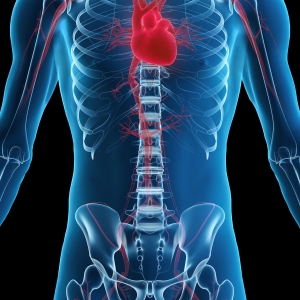
But that changed one morning six years ago when the Rockville, Maryland resident woke up with the irregular heartbeat known as atrial fibrillation.
Symptoms of atrial fibrillation include the feeling that your heart is racing or skipping a beat, shortness of breath, chest pain, dizziness, fainting and fatigue, according to the US National Heart, Lung, and Blood Institute.
"You can feel it in your chest," Schmelz said. "I knew right away something was wrong. It felt like a muscle spasm, and my heart was racing. That morning was the first time I ever noticed it."
Blood pooling in the heart
Schmelz called his doctor's office, and they asked him to come in right away. After an electrocardiogram (EKG), a test that measures the heart's electrical activity, showing how fast it's beating as well as its rhythm, his doctor sent him to the hospital for observation.
"My doctor said the danger with atrial fibrillation is that there's a risk of blood pooling in the heart because some blood just sits there, and that leads to a greater chance that a blood clot can form and cause a stroke," Schmelz said. He was put on blood thinners while in the hospital to prevent clots from forming and now takes aspirin daily for the same purpose.
Read: Heavy drinking may raise risk of atrial fibrillation
Other episodes
After that first episode, Schmelz's heart rhythm returned to normal in about 36 hours, though he's had other atrial fibrillation episodes since.
"It happens throughout the day in minor – a couple of seconds – episodes," he said. "The prolonged episodes don't happen often, but if they last more than a couple of hours, I have to go back into the hospital." There they put him on medications that thin his blood more than aspirin does.
Cutting back on exercise
As for exercise, Schmelz said he's cut back since his diagnosis. He now works out for about an hour a day and makes sure his heart rate doesn't go above the limit set by his doctor.
"I don't push myself as hard," he said. "It's important that I don't get exhausted from exercise." And, he said, he's now 56 so some of the decline in activity may be from ageing, too.
But overall, Schmelz said he considers himself pretty lucky because atrial fibrillation hasn't changed his life significantly. He may exercise less now, but he said he's read stories about people who have a much harder time than he does.
"It interferes with my life once a year or so, so it's pretty unintrusive," he said. "For some people, it's a constant way of life."
Read more:
Yoga may help with atrial fibrillation
Atrial fibrillation stroke risk in women
Atrial fibrillation increases stroke risk




 Publications
Publications
 Partners
Partners











